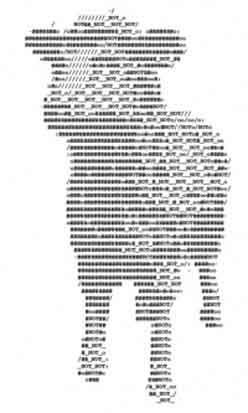|
Not Sheep: New Urban Enclosures and Commons
Not Sheep: New Urban Enclosures and Commons gathers a varied set of examples and speculations on new urban enclosures and commons from 50 international artists, writers, architects and theorists. The title of the project takes its name from the wooly emblem of the historical enclosure of common land that began in 16th century England as peasants were driven from arable farming land to make room for sheep-walks. But rather than being a mythical moment in capitalism, the enclosing of commons is a process that is in full force today, and visible in the changing shape of cities globally.
Not Sheep looks at the ways that city territories are becoming increasingly closed off and common goods and spaces enclosed, privatized or gated off. From the privatization of Dresden's public housing stock to pay the city's debts, the eviction of community gardeners to make warehouse space in Los Angeles, to more subtle shifts in the production of public space, the process of enclosure is a strategy that is remaking urban experience today. Yet examples of "commoning," the making of common spaces and resources, are also visible: Caracas turning urban brown space into sites of urban agriculture, squatting actions such as Woodsquat in Vancouver and the Pope Squat in Toronto challenging an ownership model that closes off housing space, and the opening of wireless LAN systems such as Bristol Wireless.
These intertwined processes of enclosing and commoning have been investigated, initiated and intervened by contributors from cities as varied as Gdansk, Berlin, New York, Vancouver, Vienna, Bucharest, Sao Paulo and Rotterdam. Not Sheep is a catalogue of urban projects and writing that examines both new and old forms of urban enclosures and urban commons. Each contribution to the project was emailed and later printed out for exhibition, effectively pointing to digital communication as another possibility for enclosures and commons.
Marian Penner Bancroft (Vancouver), Judith Barry (New York), Jochen Becker (Berlin) Ron Benner (London, Ont.), Bik Van der Pol (Rotterdam), Nicholas Blomley (Greater Vancouver), Claudia Bosse (Vienna), Class of Post-Conceptual (Art) Practices/Academy of fine Arts (Kevin Dooley, Katharina Morawek, Lilo Nein, Stefan Pederson, Michael Pötschko, Josef Steinkogler, Vienna), Clint Burnham (Vancouver), Mariana Celac + Iosif Kiraly (Bucharest), Vitor Cesar (Sao Paulo / Vienna), Steve Collis (Greater Vancouver), Oliver Croy (Berlin), Calin Dan (Bucharest / Rotterdam), Doménec (Barcelona), Roger Farr (Greater Vancouver), Marina Grzinic (Ljubljana / Vienna), Mona Hahn (Vienna), Jamelie Hassan (London, Ont.), Antonia Hirsch (Berlin / Vancouver), Ashley Hunt (Los Angeles), Fiona Jeffries (Vancouver), Susan Kelly + Stephen Morton (London, UK), Klub Zwei (Simone Bader / Jo Schmeiser, Vienna), Martin Krenn (Vienna), Lin + Lam (New York), Ralo Mayer (Vienna), Vlad Nanca (Bucharest), Mark Nowak (Minneapolis / St.Paul), PAUHOF (Michael Hofstätter / Wolfgang Pauzenberger, Linz, Vienna), Lisl Ponger + Tim Sharp (Vienna), Elspeth Pratt (Vancouver), Geraldine Pratt (Vancouver), Oliver Ressler (Vienna), Stefan Römer (Munich / Berlin), Klaus Ronneberger + Georg Schöllhammer (Frankfurt / Vienna), Jayce Salloum (Vancouver), Birgit Schlieps (Berlin), Gregory Sholette (New York), Neil Smith (New York), Sophie Thorsen (Copenhagen / Vienna), Transição Listrada (Sao Paulo), Aaron Vidaver (Vancouver), Srdjan Jovanovic Weiss (New York / Belgrade), Agnieszka Wolodzko (Gdansk), Michael Zinganel (Vienna).
|
|
|
|
|
 |
|

